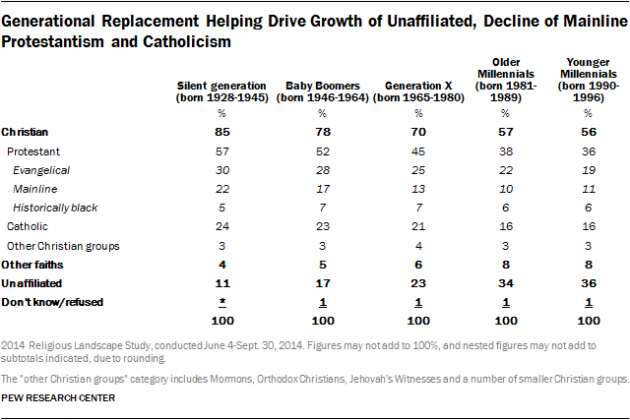Christian US population share falls; unaffiliated, other faiths grow, survey finds

The United States has more Christians than any other country but their share of the population is declining, while the number of adults who do not identify with any organized religion is growing, a new survey by the Pew Research Center shows.
Moreover, these changes are taking place across the religious landscape, affecting all regions of the country and many demographic groups.
While the drop in Christian affiliation is particularly pronounced among young adults, it is occurring among Americans of all ages.
The same trends are seen among whites, blacks and Latinos; among both college graduates and adults with only a high school education; and among women as well as men.
A large majority of Americans – some 70 per cent - continue to identify with some branch of the Christian faith.
But the major new survey of more than 35,000 Americans by the Pew Research Center finds that the percentage of adults (ages 18 and older) who describe themselves as Christians has dropped by nearly eight percentage points in just seven years.
It has dropped from 78.4 per cent in an equal sized Pew Research survey in 2007 to 70.6 per cent in 2014.
Over the same period, the percentage of Americans who are religiously unaffiliated – describing themselves as atheist, agnostic or "nothing in particular" – has jumped more than six points, from 16.1 percent to 22.8 percent.
"Overall, there are more than four former Christians for every convert to Christianity," said Alan Cooperman, Pew's director of religion research, USA Today reported.
And the share of Americans who identify with non-Christian faiths also has edged up, rising 1.2 percentage points, from 4.7 per cent in 2007 to 5.9 per cent in 2014.
Growth has been especially great among Muslims and Hindus, from a very low base.
Within Christianity like mainline (also called mainstream) Protestants, Catholics appear to be declining both as a percentage of the population and in absolute numbers.
The new survey indicates there are about 51 million Catholic adults in the United States today, roughly 3 million fewer than in 2007.
But taking margins of error into account, the decline in the number of Catholic adults could be as modest as 1 million.11.
And, unlike Protestants, who have been decreasing as a share of the U.S. public for several decades, the Catholic share of the population has been relatively stable over the long term, according to a variety of other surveys.
The Religious Landscape Study was made possible by The Pew Charitable Trusts, which received generous support for the project from Lilly Endowment Inc.
Among findings:
● Christians probably have lost ground not only in their relative share of the U.S. population but also in absolute numbers.
● American Christians – like the U.S. population as a whole – are becoming more racially and ethnically diverse.
● Religious intermarriage appears to be on the rise.
● While many U.S. religious groups are aging, the unaffiliated are comparatively young – and getting younger, on average, over time.
● Switching religion is a common occurrence in the United States.
● Christianity – and especially Catholicism – has been losing more adherents through religious switching than it has been gaining.
● The evangelical Protestant tradition is the only major Christian group in the survey that has gained more members than it has lost through religious switching.
● The Christian share of the population is declining and the religiously unaffiliated share is growing in all four major geographic regions of the country.
● Whites continue to be more likely than both blacks and Hispanics to identify as religiously unaffiliated.
